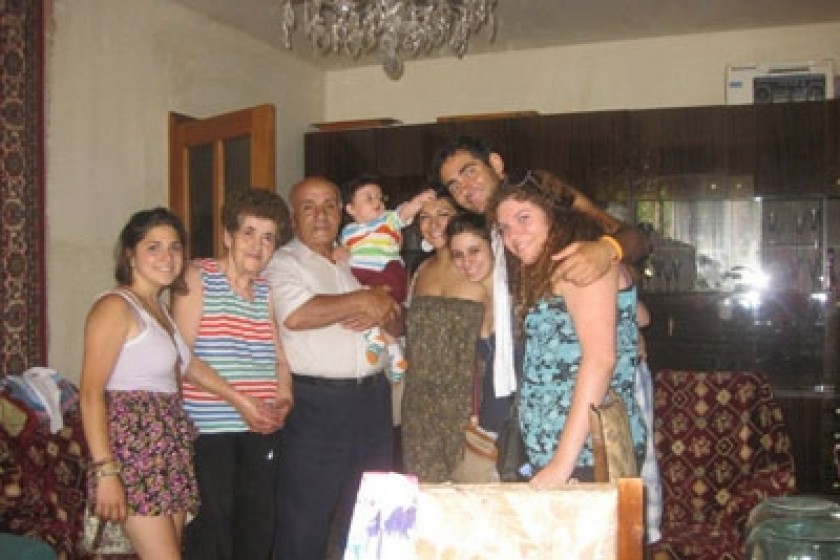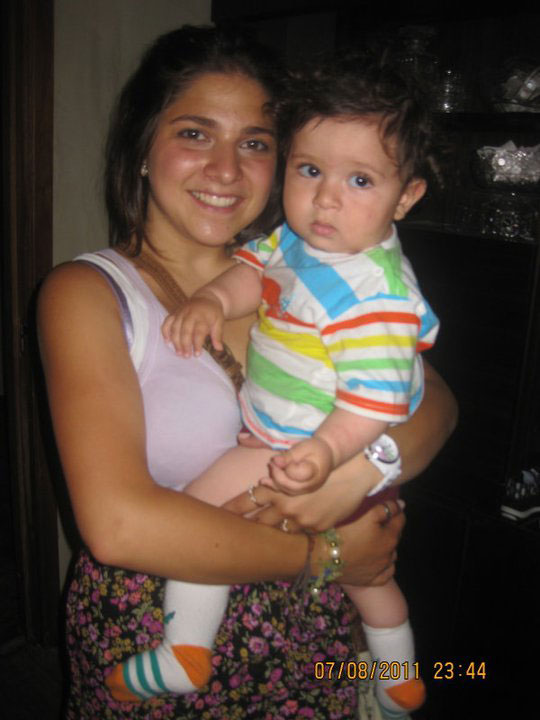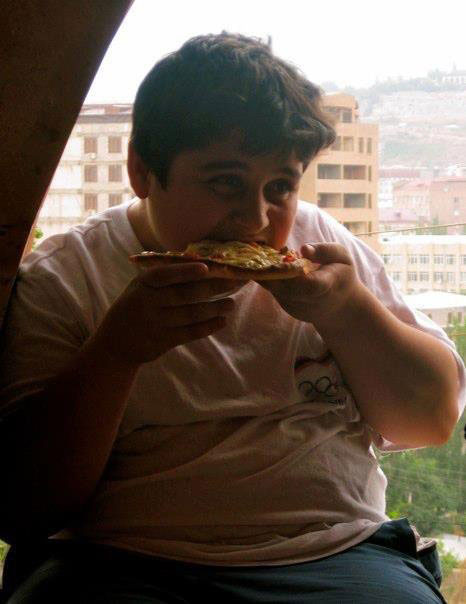
An American in Armenia: Day 15 – The Young and Old Welcoming
Samuel Armen
Birthright is an organization that, like AGBU, has an impressive repertoire in regards to helping Armenia and Armenians. Birthright Armenia is considered an “internship enhancement” program that invites Diaspora – usually in their 20s – to stay in Armenia for a minimum of 2 months. Birthright was established in 2003, making it only 8-years-old, and far younger than the 105-year-old AGBU established in 1906.
AYF – or the Armenian Youth Federation – is a 78-year-old group that is more philanthropy-based, but like AGBU and Birthright, AYF congregates a large amount of Diaspora for work experiences.
On this particular day – Day 15 – we were all scheduled to meet each other and bond by means of an exciting and most personal event: A scavenger hunt.
For once our YSIP group arrived early to an event. Unfortunately, several of the others were a bit late. We spent our time in the Birthright Headquarters and listening to Sevan Kabakian – the executive director of Birthright – discuss Birthright’s history and mission. When the other Diaspora returned we were ready.
First we were divided into five groups. The hunt would begin after we were driven to different corners on the outskirts of Yerevan – areas none of us had traversed before. For group 1, 2, 3, 4, and 5 we would be dropped off at Nork Masiv, Hat, Erebouni, 3 Mas and Davtashen, respectively. We were told we had to accomplish all the tasks then return to the Birthright Headquarters.
Four Diaspora and I were packed into a car and driven to Nork Masiv as group number 1. We held onto sealed envelopes and were given instructions not to open them until we got out. The driver twisted and turned up roads that became less and less familiar to us, and laughed when we unsuccessfully tried to guess where we were in relation to the Opera or Harabarag (Main Square).
After a half-hour of driving the car stopped on a desolate corner by a barren highway. The cabdriver wished us both good bye and good luck with the same phrase– hajogootyoon.We opened our envelopes and read:
 Task 1 – Find this statue and take a group photo in front of it.
Task 1 – Find this statue and take a group photo in front of it.
Task 2 – Find any Star Supermarket, buy something and bring us the receipt.
Task 3 – Find a local resident and sing the National Anthem “Mer Hayreniq” together. Document on video.
Task 4 – Invite yourself to the home of someone you don’t know and take a group photo with them, and take that supermarket item to that house.
Task 5 – Take a group photo of your group with 10 other local residents.
Task 6 – Convince a local resident to come with you back to the final gather place for lunch (we’ll pay for the lunch)
Task 7 – Find the #82 Marshutka to get to City Center, take a group photo in that Marshutka showing the route number, and walk back to the office.
Task 8 – Find Wood Carving Museum and take a group photo in front of it.
The five of us began walking together on the side of a highway, under the sweltering sun, with rusted cars passing by, while we passed broken down apartments. There were hungry-looking children who sat watching us with puzzled eyes, tired teenagers with gray hairs, squinting in the sunlight as they leaned against buildings aimlessly, and older adults who could resemble our grandparents.
We didn’t know where to look for us to accomplish any of our tasks. We would have to talk to them, and because of this we began a journey of learning and disenchantment.
We decided to try and accomplish as many tasks as we could at the same time. We asked around where the statue was and where the market was, and on the way we searched for ten people.
At one point we found two men who were talking outside a kiosk covered with an aluminum roof. One of the YSIP interns walked up to them and asked if we could sing Mer Hayreniq. They immediately rejected us and turned to go inside. Nevertheless, one of the interns turned on a video camera and we began singing the anthem. A few verses into the song, they turned around and watched us with what could be the smallest amount of admiration. When we were finished several other men were watching us and all of them began clapping when we were done.

The photograph of ten individuals brought us to a group of five elderly men who sat on a long bench. Like everyone else, they were extremely skeptical about our intentions. But once we showed them the picture and spoke to them in Armenian, they opened up with hospitality.
We broke our group in half and accomplished Tasks 1 and 2 simultaneously. As half our group was purchasing something in the STAR supermarket, the other half – the one I was in – found the statue. We called the other half and brought them to us.
All of the tasks involved talking to individuals who lived in this area.
The most difficult and most eye-opening task was number 4 – inviting ourselves in to a local’s house.
Atop a small ashen hill was an apartment complex that would appear entirely abandoned if it wasn’t for a singular clothesline hanging on the right which displayed clothes for all ages. We entered inside and were immediately repelled by a swarm of putrid odors: paint, cigarettes, and just a small hint of a noxiously foul scent similar to urine.
We covered our noses and walked to the staircase, where the odor ceased.
“Hello?” one of us shouted, followed by a series of faint echoes that lifted up the stairs.
We began climbing the uneven and chipping staircases. On each level was a large open window where we would pass to climb a higher flight. I call these windows open only to reveal that almost none of them had any glass.
On what I remember to be the eighth floor we began to hear noises, but after knocking on every door and waiting, we moved up another flight.
It would then be the ninth floor where we would finally encounter a man. One of our interns, the more courageous and more fluent of us, knocked on a door and crossed her arms. A man appeared at the door. He was perhaps in his sixties – but I admit I can not be sure in these areas.
She asked him if we could come inside; she told him about our task. He smiled and said the only way he’d let us in and allow photographs was if we would stay for dinner.
After the aforementioned intern’s persuasion, we ended up inside.
And inside was grand. Not in space, but in essence. The floors were a polished wood, there were variegated carpets, antiques, and there was even a very elegant-sounding piano in the corner.
It was in front of this piano where I sat as the rest of the people in the room spoke in Armenian too fast for my developing skills to decipher. Occasionally this man would turn to me with a kind smile and say something to which I would respond with a nod if I did not understand.
Eventually he caught on and asked me why I don’t speak Armenian. I told him I was adopted from Gyumri when I was three and brought up in a very English speaking community in Long Island.
He told me something I’ve been certain of: I must learn Armenian.
He then smiled again and asked if we wanted coffee. One of the interns – a journalist – looked to me and told me she isn’t a big coffee drinker.
“I bet you it’s better than any coffee you’ll ever have.” I responded, successfully persuading her.
 A woman came out holding a baby. This boy’s name was Nareg. He immediately spotted one of the interns and the interactions they had for the following hours of our stay was adorable. They were enraptured with each other.
A woman came out holding a baby. This boy’s name was Nareg. He immediately spotted one of the interns and the interactions they had for the following hours of our stay was adorable. They were enraptured with each other.
While this was happening and in between playing the piano quietly under their conversations, I noticed that there was an impressive book case to my left.
I said to one of the interns, “translate this for me, ‘whose your favorite author and who should I read?’”
She translated, told him my name, explained to him that my internship was in journalism and that I am working to be a writer.
He smiled to me again and responded “Yeghishe Charents” to my first inquiry and then contemplated. “Samvel” he laughed.
I thought he was saying my name, but he was actually referring me to a poem titled “Samvel” written by a poet named Raffi.
He lifted from his chair, walked carefully to the bookcase, and perused the polychromatic spines of tomes that seemed to all share the same golden lettering.
He grabbed a tan book, walked back to the couch, and signaled me next to him. As he read Armenian letters and words, the interns translated for me line by line. The poem was impressive through the lens of Armenia’s sacrificial loyalty to Christianity, but I do not wish to ruin the poem for anyone who has not read it.
At some point in between our talks, his reading, us playing with little Nareg, and hearing him contemplate the importance of Diaspora returning to the motherland, we all began drinking coffee. The intern who was scrupulous about the coffee lit up. I can recall with precision her blue eyes igniting as she finished her first big sip.
To quote her daily blog, it was “some of the best Armenian coffee I’ve had since I got here.”
The link to her writing – which has proven to be informative to outsiders and nostalgic for us interns – is here: http://papoog.tumblr.com/page/3
When we asked this man if he would come with us he responded what translates in English to, “I’ll go to hell with you guys.”
Fortunately, we weren’t going to hell. Unfortunately, he wasn’t able to make it. Our dinner would be immediate and he would have to stay with the family for some while.
We found the Marshutka with ease and headed back to the headquarters.
In the few hours of this journey and in the half-hour of this car ride, the genius of the day’s event became lucidly clear.
Firstly, these groups individually unite ambitious Diaspora-Armenians. The result ranges from advantageous networking to lifelong friendships. When these three groups unite for an event, the positive potential multiplies threefold.
With my head pressed against the window, I watched these partially abandoned buildings and impoverished people on the outskirts of Yerevan fade away into the more glamorous and European-styled center of Yerevan. We were leaving reality, temporarily making it as real as a memory, and slowly entering the hallucination that is central Yerevan. To bring us all together and force us into such a situation of disillusionment is one of the most remarkably intelligent choices these three Armenian organizations have ever made.
We all returned to the headquarters then went for a picnic. All the groups commingled and discussed what their escapades were like. Many had similar experience – which only corroborated the fact that this was one of the most precious experiences I’ve had in Armenia.
A few hours later the YSIP interns went back home. I sat at the terrace – my favorite room, the one mentioned in Day 4 – and began writing. The journalist intern – the girl who enjoyed real Armenian coffee a few hours earlier – was also writing.
Suddenly we heard a thud, followed by laughter.
A group of children – ranging from age 7 to 15 – were kicking a soccer ball against our house. Eventually one flew up into the terrace room. They began complaining so we gave them the ball back. Directly after, they kicked the ball right back up to us. A large interaction occurred, involving many interns, insincere bribery, acting, and consistent laughter.
One of the interns threw down a piece of a mushroom, and the largest of the boys bit into it. Immediately he made a face as if he were going to vomit, spit the mushroom out, looked up to us with a twisted grimace, and shouted “YOU EAT THIS?” He took another bite to be sure, and then spit it out again, much to our immense laughter.
 We invited them upstairs. In the following hour we fed them, challenged them to a soccer game for the next morning, compared music and even had a wrestling match. Out of all of our hospitality, it was feeding them that was the most difficult. Finally we brought out a pizza, and one of the boys ate all of it – again much to our heartfelt laughter.
We invited them upstairs. In the following hour we fed them, challenged them to a soccer game for the next morning, compared music and even had a wrestling match. Out of all of our hospitality, it was feeding them that was the most difficult. Finally we brought out a pizza, and one of the boys ate all of it – again much to our heartfelt laughter.
For me, the night ended several hours later far away from everyone in our backyard. I found myself thinking of how everyday in Yerevan seemed to present so much fullness, and almost tie itself together with an all-too-visible metaphor. There was something generational, inspirational, wonderful, educational, and unifying about the day. It was as if the elders passed hospitality to us, and we passed it to the children as if it were a legacy. I thought of the word “legacy” and the synonym “birthright” came to mind. My mind plunged into the still-sharp memories of the day and when the sounds of the children wrestling around in our house echoed outside I couldn’t help but laugh.
The real beauty of all of it, for me, to put it in its simplest form, was that everyone welcomed everyone.
 Videos
Videos Photos
Photos
Comments (1)
Write a comment